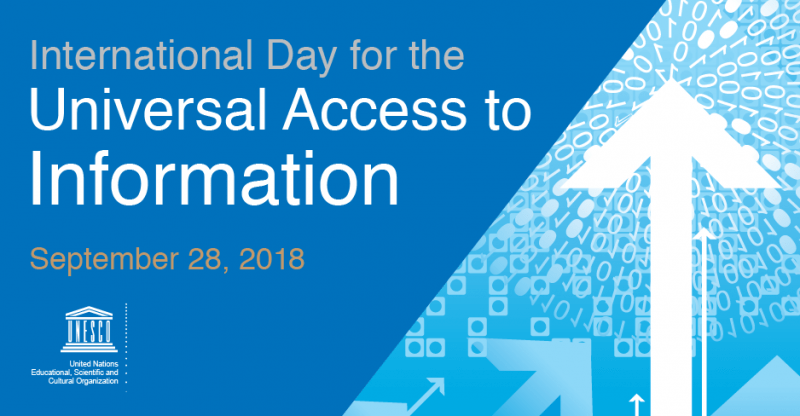Announcement |
As part of the International Day for Universal Access to Information (IDUAI) 2018 celebrations at the upcoming Forum on Internet Freedom in Africa 2018 (FIFAfrica18), UNESCO is set to host a session to raise awareness on the intersection of access to information and application of the internet universality indicators. September 28, 2018 will mark the third commemoration of the IDUAI, which reinforces target 16.10 of the Sustainable Development Goals (SDG) which calls for ensuring public access to information and protection of fundamental freedoms.
The session comes at a time when African states are increasingly impeding digital rights including through restrictive content regulations, retrogressive laws and financial barriers – and inseparably limiting access to information for socio-economic development. It is fundamental therefore to have a standard tool of measurement to help states and non-state actors to measure policy decisions and regulatory actions.
In 2015, the concept of “Internet Universality” was adopted by the General Conference of the United Nations Educational Scientific and Cultural Organisation (UNESCO) with the goal of highlighting features of the internet which are fundamental to fulfilling its potential for sustainable development and for realising an inclusive knowledge society. Based on four principles – the R-O-A-M principles – the internet universality indicators are aimed at helping states and other stakeholders to measure internet policies as well as serve as a research tool for assessing internet development.
R – that the internet is based on human Rights
O – that it is Open
A – that it should be Accessible to all
M – that it is nurtured by Multistakeholder participation.
Application of the R-O-A-M principles is underscored by the need for public access to information, a target well outlined in Goal 9 of the SDGs which also calls for the significant increase in access to information and communications technology and to strive to provide universal and affordable access to the Internet in least developed countries by 2020.

The Forum provides a unique platform for this engagement as it convenes various stakeholders from the internet governance and online rights arenas in Africa and beyond to deliberate on gaps, concerns and opportunities for advancing privacy, access to information, free expression, non-discrimination and the free flow of information online on the continent.
Through its regional offices in Eastern Africa and in Southern Africa, UNESCO has participated in previous FIFAfrica editions. Last year’s Forum in Johannesburg, South Africa hosted the IPDC talks Southern Africa competition awards ceremony and panel discussions on media and SGD’s advocacy.
For details on the programme for FIFAfrica18, see the agenda. Other details about FIFAfrica can be found at www.internetfreedom.africa.

